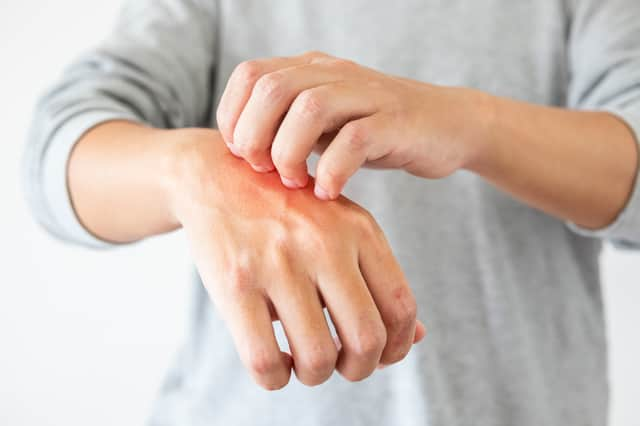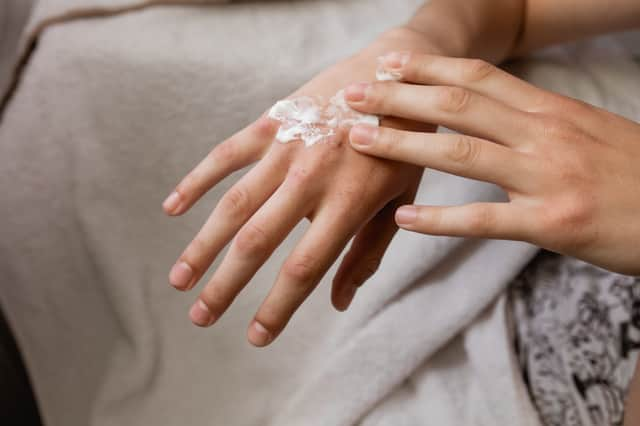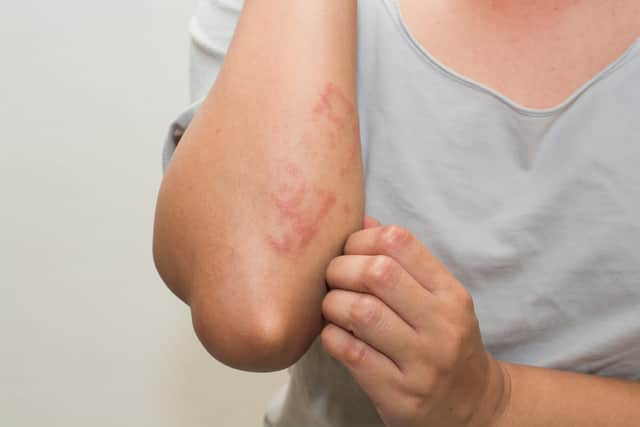Scabies outbreak: What is Scabies, how can it be treated and why is it spreading across the UK?


Tiny burrowing mites have been causing chaos across the UK with a large surge in the number of reported cases of Scabies.
The outbreak is the result of medication shortages according to the Guardian, with doctors warning that it could pose a "major public health concern".
What is Scabies?
Advertisement
Hide AdAdvertisement
Hide AdScabies is a highly infectious itchy skin condition caused by an allergic reaction from tiny mites burrowing into the skin and laying eggs. Anyone can develop scabies and it can take up to eight weeks before itching and other symptoms begin to appear.
There are two types of Scabies: classical scabies and crusted scabies.
Classical scabies presents as an itchy skin rash as a result of mites, typically the size of pinheads, under the skin.
Crusted scabies is the same, though not all people will itch, though it involves many, many more mites than the other variety. It is more common in those with a weakened immune system and is also more infectious, causing a crusted, flaking rash around joints such as the elbows and knees.
How to identify scabies
The main symptoms of scabies are an intense itching, particularly at night when the skin is warmer, as well as a raised rash or spots which you should be able to feel.
The scabies rash can spread across the whole body, excluding the head and neck, often affecting the skin between fingers, wrists, under the arms and around the waist, groin and bottom areas. In addition, children and older people are more likely to see a rash develop on the head, neck and other regions such as their palms and soles of the feet.
Rashes can appear anywhere on the body, and if it spreads can turn into tiny spots. Burrow lines – small lines with a dot at one end – may also be found under the skin as a result of the eggs laid by mites. They are short, wavy silver coloured lines.
How is scabies spread?
Scabies is caused by the parasite, Sarcoptes scabiei. The intense itching feeling associated with the condition is thought to be caused by an immune reaction to the mites, their saliva, eggs and faeces.
Advertisement
Hide AdAdvertisement
Hide AdIt is spread from human body to another as the result of direct and prolonged physical contact. For example, holding hands, having sex or even sharing clothing or bedding with an infected person, though this is rare.
Is scabies an STD?
While scabies is not an STD, it can be transmitted through close physical or sexual contact.
How to avoid getting scabies
With the recent outbreak of scabies across the UK, the risk of acquiring scabies has increased in settings such as hospitals, nursing homes, childcare centres and other institutions.
It is not caused by a lack of hygiene – though daily showers, frequent hand washing and regularly changing clothes can help – and can be treated through medication, though it spreads quickly as most people who contract the mites are unaware of their presence for at least two to three weeks after infection.


NHS Inform shares that “scabies mites can survive outside the human body for 24 to 36 hours” which can make infection via contaminated items such as clothing or towels a possibility, though it is rare.
To get rid of the mites, make sure to wash clothing and bedding at 60C, and if there’s anything that can’t be washed, be sure to bag it up for at least 72 hours.
In cases of crusted scabies, make sure to clean the floors thoroughly, regularly vacuuming carpets and other furniture.
Can scabies go away on its own? What you should do if you have scabies
If you think you have scabies, contact your GP or pharmacist immediately as medical treatment is necessary to get rid of the infection.
Advertisement
Hide AdAdvertisement
Hide AdPrompt treatment can help prevent the spread of scabies, and even if only one person in a household is presenting symptoms of infection, the entire household and anyone who has come in close contact with someone who has scabies, such as sexual partners, must also be treated to avoid re-infection.


Treatment typically involved applying a lotion or cream to the entire body, excluding the head. Skin should be cool and dry, with extra attention paid to areas such as the back, between fingers and toes as well as the genitals and under nails, with repetition needed seven days after the first treatment.
It can take up to a month for the general itching to subside completely, though once the first treatment has been applied it should be safe for members of the household to return to school or work.
Why is the UK experiencing a scabies outbreak?
The two most common treatment options for scabies in the UK are permethrin and malathion, however issues related to the war in Ukraine and the rising cost of materials has caused shortages in both.
As a result of delays to treatment and difficulty tracking those who may be infectious, scabies is spreading throughout the UK.


In a release about the supply of treatment, Professor Mabs Chowdhury, president of the British Association of Dermatologists (BAD), said: “The shortage of treatments for scabies is a major public health concern. This a common condition, which is highly contagious. The ease with which it spreads highlights the urgency of maintaining an adequate supply of effective treatments. This is not an issue which will just go away.
“We urge manufacturers of permethrin and malathion to do everything in their power to increase production. We also call on regulators, such as the MHRA, and the Government to give the necessary support to manufacturers and suppliers to enable them to rapidly resolve the issue.”
Comments
Want to join the conversation? Please or to comment on this article.
